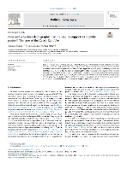| dc.contributor.author | Dvořák, Tomáš | |
| dc.contributor.author | Zouhar, Jan | |
| dc.contributor.author | Bíba, Jan | |
| dc.date.accessioned | 2025-04-14T16:11:02Z | |
| dc.date.available | 2025-04-14T16:11:02Z | |
| dc.date.issued | 2025 | |
| dc.identifier.uri | https://hdl.handle.net/20.500.14178/3077 | |
| dc.description.abstract | In recent decades, a strong demographic decline has characterized post-communist Central and Eastern European countries. Using the Czech Republic as a case study, we apply a multilevel structural equation model to test the mechanism whereby demographic decline translates into support for populist parties. Combining regional and individual data, we show that the long-term demographic decline (measured at the regional level) recorded between 2008 and 2017 had an impact on preferences in favour of two populist parties: the radical populist party, Freedom and Direct Democracy (SPD), and a more moderate populist party, ANO 2011. The results of this analysis point to a mechanism where demographic decline is associated with a breakdown of social capital, which is then associated with voting behaviour in favour of both populist parties. | en |
| dc.language.iso | en | |
| dc.relation.url | https://doi.org/10.1016/j.polgeo.2024.103261 | |
| dc.rights | Creative Commons Uveďte původ 4.0 International | cs |
| dc.rights | Creative Commons Attribution 4.0 International | en |
| dc.title | How and why does demographic decline lead to support for populist parties? The case of the Czech Republic | en |
| dcterms.accessRights | openAccess | |
| dcterms.license | https://creativecommons.org/licenses/by/4.0/legalcode | |
| dc.date.updated | 2025-04-14T16:11:02Z | |
| dc.subject.keyword | Demographic decline | en |
| dc.subject.keyword | Populism | en |
| dc.subject.keyword | Social capital | en |
| dc.identifier.eissn | 1873-5096 | |
| dc.relation.fundingReference | info:eu-repo/grantAgreement/MSM//EH22_008/0004595 | |
| dc.date.embargoStartDate | 2025-04-14 | |
| dc.type.obd | 73 | |
| dc.type.version | info:eu-repo/semantics/publishedVersion | |
| dc.identifier.doi | 10.1016/j.polgeo.2024.103261 | |
| dc.identifier.utWos | 001403313500001 | |
| dc.identifier.eidScopus | 2-s2.0-85212840818 | |
| dc.identifier.obd | 661549 | |
| dc.subject.rivPrimary | 50000::50400::50401 | |
| dc.subject.rivSecondary | 50000::50700::50701 | |
| dcterms.isPartOf.name | Political Geography | |
| dcterms.isPartOf.issn | 0962-6298 | |
| dcterms.isPartOf.journalYear | 2025 | |
| dcterms.isPartOf.journalVolume | 117 | |
| dcterms.isPartOf.journalIssue | Neuveden | |
| uk.faculty.primaryId | 118 | |
| uk.faculty.primaryName | Fakulta sociálních věd | cs |
| uk.faculty.primaryName | Faculty of Social Sciences | en |
| uk.faculty.secondaryId | 114 | |
| uk.faculty.secondaryName | Filozofická fakulta | cs |
| uk.faculty.secondaryName | Faculty of Arts | en |
| uk.department.primaryId | 345 | |
| uk.department.primaryName | Katedra sociologie | cs |
| uk.department.primaryName | Department of Sociology | en |
| uk.department.secondaryId | 825 | |
| uk.department.secondaryName | Ústav politologie | cs |
| uk.department.secondaryName | Department of Political Science | en |
| dc.type.obdHierarchyCs | ČLÁNEK V ČASOPISU::článek v časopisu::původní článek | cs |
| dc.type.obdHierarchyEn | JOURNAL ARTICLE::journal article::original article | en |
| dc.type.obdHierarchyCode | 73::152::206 | en |
| uk.displayTitle | How and why does demographic decline lead to support for populist parties? The case of the Czech Republic | en |

